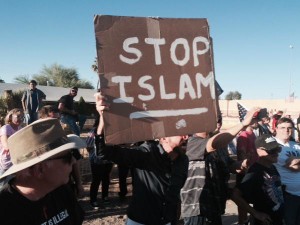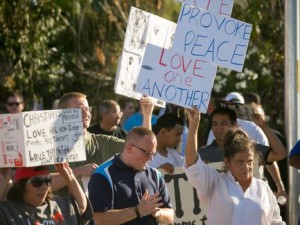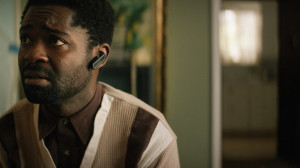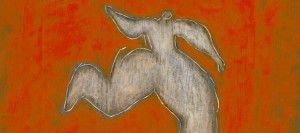Guns & Hate. And Good. A short essay by Dayle Ohlau
June 2, 2015
Guns and hate. Protests against Muslims outside a Phoenix mosque this past weekend. If there are truly only two emotions, love and fear, then what is it that these protesting Americans fear?
Dean Obeidallal a former attorney, host of SiriusXM’s weekly program “The Dean Obeidallah Show,” and a columnist for The Daily Beast,”wrote a piece for CNN online quoting Martin Luther King, Jr:
“History will have to record that the greatest tragedy of this period of social transition was not the strident clamor of the bad people, but the appalling silence of the good people.
http://www.cnn.com/2015/05/31/opinions/obeidallah-anti-muslim-rally/
He writes about the good he observed that day. The good people, the people who felt love, not fear, who came to counter-protest. Yet, there were also those trying to give what they got, calling the protestors names, like “Nazis”. When we belittle and fight hate with more hate, and violence, we are missing the opportunity to embrace the humanity of a group that is living in fear, and not understanding the power of the interconnectedness of all people. As a nation, when did we become so ethnocentric, wanting to deny immigrants and religions different from our own? Our country was founded on immigrants and religious freedom. In retrospect of history, it seems, at times, that we have not evolved very far. I am reminded of a chapter in Swiss psychiatrist and psychotherapist Carl Jung’s book Memories Dreams, Reflections, when he visits the Pueblo Indians in New Mexico, circa 1925:
“I observed that the Pueblo Indians, reluctant as they were to speak about anything concerning their religion, talked with great readiness and intensity about their relations with the Americans. ‘Why, (Mountain Lake said) do the Americans not let us alone? Why do they want to forbid our dances? Why do they make difficulties when we want to take our young people from school in order to lead them to the kiva (site of the rituals), and instruct them in our religion? We do nothing to harm (them). After a prolonged silence he continued, ‘The Americans want to stamp out our religion. Why can they not let us alone? What we do, we do not only for ourselves but for the Americans also. Yes, we do it for the whole world. Everyone benefits by it.”
Many protesting were Christians…in what name did they hate? Jesus? I am reminded of the bracelets that so many wear, “What would Jesus do?” Why did they forget to ask themselves this question before they began their hate-filled, fear-filled protest? I remember learning in my young Lutheran years that Jesus spoke of not resisting evil, but shining the light – – holding the conscious of God within.
The day of the protests I retrieved a beloved book by author Parker Palmer (founder the Center for Courage & Renewal) called, Healing the Heart of Democracy. He writes:“It breaks my heart when democracy is threatened, from within or without – – when we undermine ourselves by indulging in cheap animosities toward those who disagree with us instead of engaging our differences like grown-ups…”
He also writes:
I believe in the power of the human heart to do evil as well as good. The heart leads some to become terrorists and others to serve the hungry and homeless. The heart leads some to blow up federal buildings in order to ‘bring down the government’ and others to see that we are the government and must work together to fulfill democracy’s promise. The heart is a complex force field, no less complex than democracy itself, a maelstrom of conflicted powers that we ignore, sentimentalize, or dismiss at our peril. The human heart, this vital core of the human self, holds the power to destroy democracy or to make it whole. That is why our 19th-century visitor, Alexi de Tocqueville, insisted in his classic Democracy in America that democracy’s future would depend heavily on generations of American citizens cultivating the habits of the heart that support political wholeness.
Palmer dedicates his book to the memory of Christina Taylor Green, Addie Mae Collins, Denise McNair, Carole Robertson, and Cynthia Wesley.
“Christina died when an assassin in Tucson, Arizona, opened fire at a public event hosted by Congresswoman Gabrielle Giffords, who was seriously wounded. Addie Mae, Denise, Carole, and Cynthia died when violent racists bombed the 16h Street Baptist Church in Birmingham, Alabama. When we forget that politics is about weaving a fabric of compassion and justice on which everyone can depend, the first to suffer are the most vulnerable among us – – our children, our elders, our poor, homeless, and mentally ill brothers and sisters. As they suffer, so does the integrity of our democracy. “
I am grateful for those who chose not keep silent this past weekend and support religious freedom for those who were being protested against. I am grateful that Mr. Obeidallal honored the counter-protestors with his article for CNN. And I am hopeful, as Palmer writes, that when the common good is threatened in our country we will “hang on and hang together – that we have the power to do just that in our hands and in our hearts.”
From Terry Tempest Williams, “Engagement”:
“The human heart is the first home of democracy. It is where we embrace our questions. Can we be equitable? Can we be generous? Can we listen with our whole beings, not just our minds, and offer our attention rather than our opinions? And do we have enough resolve in our hearts to act courageously, relentlessly, without giving up – – ever – – trusting our fellow citizens to join with us in our determined pursuit of a living democracy?”
Terry Gross interviews David Oyelowo
David’s films include: “Selma,” he was Martin Luther King – – in “The Butler,” he was the son who was active in the civil rights movement and became a Black Panther – – in “Red Tales,” he was one of the Tuskegee airmen.
David was bullied as a young boy facing racism in London, where he was born, and when he and his family moved to Nigeria to escape the bullying he had been facing, only to eventually return to London. Terry asked him if there were any roles he didn’t want to do?
“I’ve never ever taken a role for money purposes or for some bizarre notion of what may be the kind of career move that would open things up for me. If I don’t believe in it, I can’t do it because I won’t be good in it if I don’t believe in it. (And) roles that basically feed into a kind of stereotype of what it is to be black. Don’t send me your script if you want me to play the black best friend; I just won’t do that. — But you can feel when it’s literally an afterthought; you can feel when it’s like, oh, quick, let’s get some color in here, you know. That I won’t do because it’s disrespectful and I – you know, for me, I’m either part of the solution or I’m part of the problem. So I won’t do that; I won’t do roles that I deem to be stereotypical or caricatures of what it is to be black or even just to be a human being. I won’t do that – I hate horror; I don’t like horror films. I don’t really personally see the value in them. And, you know, also anything that basically is overtly celebrating darkness and to be perfectly honest, sanctioning it; that’s something I can’t personally do. I feel you cannot see the light without darkness but for me, a prerequisite I have for myself is that light must eventually win out. And that’s just what I choose to put out into the world; I believe in it. I know that films affect and shape culture, and I want to put stuff in the world that I feel is edifying as opposed to stuff that is detrimental.”
Full interview:
http://www.npr.org/templates/transcript/transcript.php?storyId=409718943
‘Do what you love.’
“Perhaps what is truly known can not be described or articulated by creativity or logic, science or art.”
From Maria Papova:
In her altogether fantastic commencement address on courage and the creative life – one of the greatest commencement addresses of all time – artist, designer, and Design Matters host Debbie Millman offers:
“The grand scheme of a life — maybe, just maybe — is not about knowing or not knowing, choosing or not choosing. Perhaps what is truly known can’t be described or articulated by creativity or logic, science or art. Perhaps it can be expressed by the most authentic and meaningful combination of the two: poetry.
As Robert Frost once wrote, “A poem begins as a lump in the throat, a sense of wrong, a homesickness, a lovesickness. It is never a thought to begin with.”
I recommend the following course of action for those, like you, who are just starting out, or who, like me, may be re-configuring midway through. Heed the words of Robert Frost. Start with a big fat lump in your throat. Start with a profound sense of wrong, a deep homesickness, a crazy lovesickness, and run with it. If you imagine less, less will be what you undoubtedly deserve. Do what you love. And don’t stop until you get what you love. Work as hard as you can. Imagine immensities. Don’t compromise and don’t waste time. In order to strive for a remarkable life, you have to decide that you want one. Start now. Not twenty years from now. Not thirty years from now. Not two weeks from now. Now.”
Is America’s obesity epidemic actually a spiritual crisis?
“Michael sees his battle with obesity in spiritual terms — as an existential crisis. I wonder if we all might gain in self-understanding if we began to think of the so-called obesity epidemic, at least in part, as a food-focused spiritual or existential struggle that increasingly afflicts modern men and women.”
Seth Godin ❥❥
“The heart of real growth is a simple idea: People decide to tell other people.”




